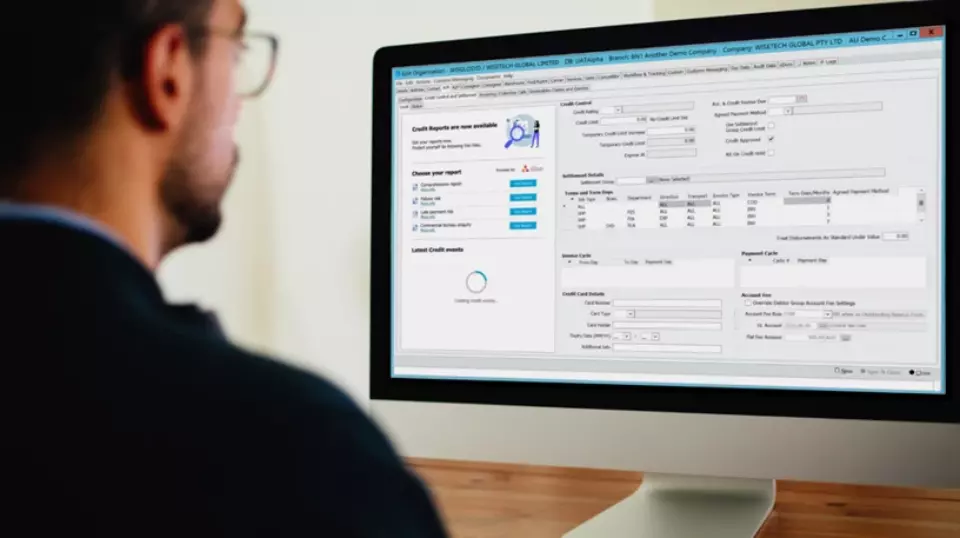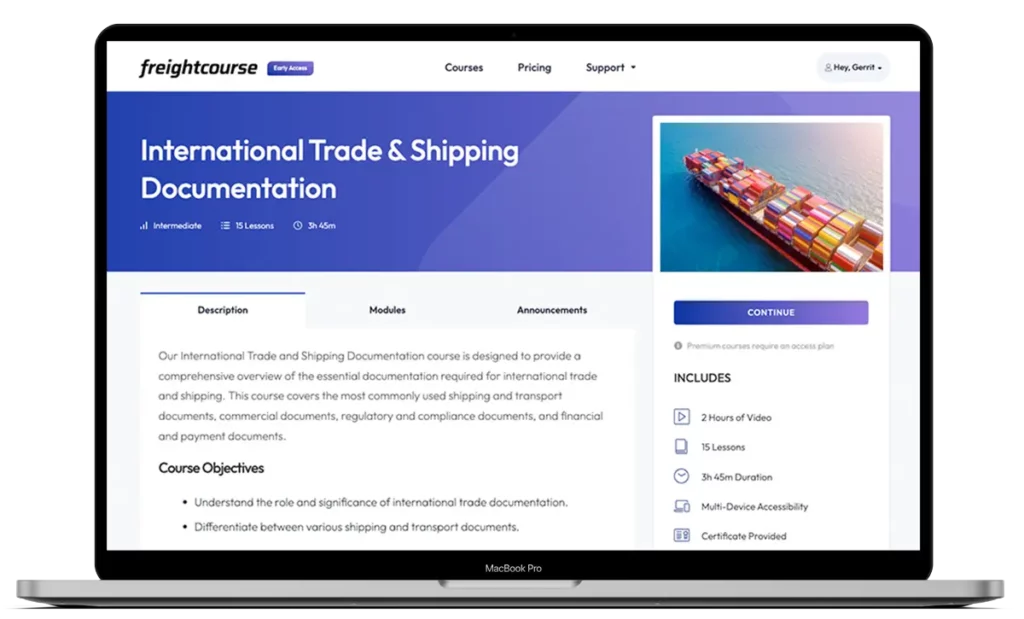Transport companies that move freight through various modes of transport are often required to store information from different parties and report regular shipment updates to their customers.
Managing all of these aspects in the freight and logistics industry can be challenging, especially when data is managed manually. In light of this, logistics companies have implemented digital systems and solutions to aid them with their processes. One of the most essential systems they use is a Transport Management System (TMS).
A Transport Management System is a transport and supply chain management platform that is designed to digitalize, streamline, expedite, automate, and manage shipping processes when moving cargo by land, air, sea, or a combination of different transport modes.
In this article, we will be taking a detailed look at transport management systems and exploring their key functions, features, and benefits. We’ll also talk about their applicability in different segments of the freight industry and factors that should be considered when procuring a TMS.
What Is Transport Management System (TMS)?
A Transport Management System is a software solution designed specifically for transportation management in the freight industry. These systems are designed to be centralized platforms for carriers, brokers, freight forwarders, trucking companies, and other related parties in which they are able to streamline operational activities, manage shipments and orders, plan routes, and much more.

In essence, transport management systems enable logistics companies to simplify, accelerate, and streamline their logistics process, helping them reduce operational expenditure, improve supply chain visibility, and improve customer service.
Common features include data analytics, reporting, and freight auditing, using which users can generate actionable insights and make better decisions related to the movement of goods by land, air, or sea.
Most TMS platforms can be customized to cater to an organization’s specific needs. Moreover, users can integrate existing databases, systems, and technologies to increase operational efficiency and overcome various challenges in the ever-evolving supply chain industry.
Functions & Features of a TMS
Transport Management Systems come with various features and benefits that increase productivity by streamlining operations and documentation. There are a variety of functions and features that TMS platforms are able to offer.

- Order Management – Users can create and process purchase and shipping orders using a TMS. It allows them to receive purchase orders from customers, monitor vendor fulfillment, and set pickup and delivery locations, routes, and special instructions.
- Tracking & Visibility – A TMS allows users to track their freight and fleet in real-time and get updates on delivery statuses, estimated time of arrival, current location, and more. Simply put, the platform enhances the overall visibility of operations, documentation, and shipments.
- Freight Booking – Transportation companies can use TMS platforms to select and book the right carriers based on service level/quality, type of equipment, reliability, documentation requirements, and other details.
- Reporting – A TMS can generate detailed reports on performance, cost per mile, idling, carrier utilization, and other essential metrics for KPI management and decision-making.
- Data Analytics – Modern Transport Management Systems are equipped with data analytics that allows them to collect and analyze data to identify market trends, allowing users to make data-driven decisions to optimize operations.
- Procurement Management – With a TMS, users can manage various transportation procurement processes, including vendor selection, third-party cargo handling equipment contracts, and more.
- Quoting & Invoicing – Freight companies can generate and manage invoices and quotes for freight services rendered using a TMS. The solution ensures accurate billing and financial reporting. Modern platforms can also automate billing processes and detailed reports.
- Freight Audit & Payment – With a Transport Management System, carriers and users can enable seamless freight invoice auditing and automate the reconciliation process between shippers, vendors, and other supply chain stakeholders.
- Integration – More advanced transport management systems feature API and EDI integration options that allow users to seamlessly integrate other systems, including Warehouse Management Systems (WMS) and Enterprise Resource Planning (ERP) solutions.
- Collaboration & Communication – Most TMS are equipped with messaging and notification functionalities. They can facilitate internal communication and collaboration between shippers, carriers, brokers, suppliers, and other stakeholders.
Applicability of Transport Management Systems in The Logistics Industry
Transport Management Systems have become an indispensable tool for most carriers and businesses operating in the freight industry, regardless of their services or industry niche. All service providers can benefit from TMS in their logistics processes, from trucking companies to air couriers and maritime shipping agencies.
TMS in the Trucking Industry
Trucking companies use transport management systems to handle various functions throughout the entire transportation process, including load planning, booking, tendering, tracking, billing, auditing, reporting, and analytics.
For instance, a carrier may integrate a digital freight matching platform into their TMS when booking loads. Once they find a shipper, the details can be pushed automatically to their TMS and accordingly select their resources (trucks, drivers, equipment, etc.).
They can enable real-time shipment visibility from pickup to delivery using integrated GPS tracking from trucks and communication capabilities. Following delivery, they can analyze different metrics, including drivers’ hours of service (HOS), idling, automated billing, and more.
TMS in the Shipping Industry
Freight forwarders in the shipping industry use transport management systems to streamline operations, automate processes, measure productivity, enhance visibility, and more. Shipments are typically created directly in the platform where operators upload important shipping documents.
Certain transport management platforms are integrated directly with shipping lines to retrieve vital shipping updates such as estimated and actual arrival times, empty container returns, and many more.
Certain transport management systems are also able to provide real-time shipping updates, as they are connected to external data sources, such as AIS, which enable a convenient way to track shipping containers.
TMS in the Air Freight Industry
Air freight is the fastest way to move goods from one location to another. Therefore, operations are much more time-critical and require an active platform to manage bookings and cargo details.
Carriers must coordinate with multiple stakeholders, including airports, airlines, handlers, freight forwarders, and customs agencies. A TMS allows air freight carriers a streamlined approach to place bookings, plan routing, and schedule cargo.
Moreover, they can enhance visibility into cargo movement and manage documentation and compliance seamlessly. Advanced TMS also provides real-time data analytics and reporting, enabling carriers and connected companies to monitor different KPIs, identify issues, and make better decisions.
How Have Transport Management Systems Impacted the Logistics Industry?
Transport Management Systems have revolutionized the logistics industry in many ways by unlocking various benefits for carriers, agents, freight forwarders, and transport companies. Below, you’ll find some of the most important benefits explained in detail.
Visibility
With fleet, container, vessel, and flight tracking, transport companies are able to share real-time visibility with their customers and monitor shipment location and status on demand.

Transport management systems serve as a centralized platform that aggregates internal and external data. This allows operators to manage exceptions, address delays and resolve issues proactively, increasing the overall supply chain efficiency.
Cost Efficiency
Transport companies also use these platforms to optimize delivery routes, plan shipments, and consolidate loads to reduce expenditure and maximize revenue. TMS platforms can also be used to select carriers best suited for specific shipments based on rates, fleet, equipment, and additional services.
These systems also significantly reduce administrative work by streamlining operations processes and tasks. Therefore, companies can reduce their resource requirements and repurpose their workforce on core business activities to improve productivity and profitability.
Operational Productivity
Transport management systems can help operators simplify, automate, and streamline tasks like route planning, order processing, shipment creation, bookings, documentation management, and tracking. The best platforms in the market are enhanced with big data, artificial intelligence, and other technologies.
They are equipped with features that reduce manual and repetitive tasks, freeing up time and resources for core activities that can improve operational productivity, resource utilization, and business performance.
Decision-Making
TMS improves decision-making by handling big data, performing data analytics, and providing powerful reporting tools with several metrics and KPIs users can customize according to their operations.
These systems are a must-have solution for freight and logistics businesses that use data to analyze profitability, market trends, and similar aspects.
Documentation
A market-leading transport management system has the capability to automate documentation processes with uploading, scanning, accuracy checks, and verification. One of the key benefits of automation is improved accuracy and operator experience.
Users can ensure compliance with regulations, avoid penalties, and minimize process delays by reducing document errors and increasing timeliness. Most platforms also act as document repositories that allow multi-user access.
TMS Integrations
Transport Management Systems can be integrated with multiple software solutions, including Enterprise Resource Planning (ERP) platforms, Digital Freight Matching Tools, Order Management Systems (OMS), Warehouse Management Systems (WMS), and more.
Integration between these platforms is either done through Electronic Data Interchange (EDI) or Application Programming Interfaces (APIs) – both of these integration technologies enable data exchange between multiple systems.
Points to Consider in the TMS Procurement Process
If you or your organization is considering procuring a Transport Management System for your operations, you may want to consider the following factors before finalizing your decision.
Cost Impact on the Business
The first thing any freight business needs to consider before TMS adoption is the implementation costs, which include product procurement, customization, integrations, ongoing maintenance, and support. In the long run, understanding the total cost of ownership is crucial to anticipate or predict the return on investment and expected benefits.
Integration with Existing Systems
Most carriers and shipping companies use existing supply chain and logistics systems, such as WMS, ERP, and more. Therefore, they must determine if their solutions are compatible with their desired TMS so they can integrate them seamlessly to ensure efficient data flow and compatibility.
Features & Functionality
Transport Management Systems offer an abundance of features and functionalities, including order management, data analytics, route planning, fleet tracking, carrier selection, and invoicing, to name a few.
Therefore, each logistics business needs to identify the business requirements and prioritize features that add the most value to its operations. The modularity of a transport management system is equally important.
As most companies within this site may not be able to afford a full solution, modularity allows smaller transportation companies to customize and adopt key aspects of a TMS that benefits its core business immediately while giving them the option to add on other features in the future.
Ease of Use
Each business should also consider ease of use and adoption when selecting an optional transport management system. User experience and ease of use can boost productivity, willingness to adopt new systems, and even streamlines operation processes.
It’s important to assess each team’s tech-savviness and ensure experienced users and new employees can navigate the platform intuitively. The more complex the platform is, the more time each process may take and effectively lower the adoption rate of the TMS.

Get Free Course Access
If you enjoyed the article, don’t miss out on our free supply chain courses that help you stay ahead in your industry.

Andrew Lin
Co-Founder & Writer
at freightcourse
About the Author
Andrew is a multi-business owner with over 12 years of experience in the fields of logistics, trucking, manufacturing, operations, training, and education.
Being the co-founder of freightcourse has given him the ability to pursue his desire to educate others on manufacturing and supply chain topics.
Follow us